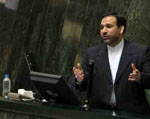 AFP: Iran’s Finance Minister Shamseddin Hosseini said Tuesday that international sanctions had pushed inflation above 30% and were causing “a lot of trouble” but that Iran’s nuclear drive would not be halted.
AFP: Iran’s Finance Minister Shamseddin Hosseini said Tuesday that international sanctions had pushed inflation above 30% and were causing “a lot of trouble” but that Iran’s nuclear drive would not be halted.  UNITED NATIONS (AFP) — Iran’s Finance Minister Shamseddin Hosseini said Tuesday that international sanctions had pushed inflation above 30% and were causing “a lot of trouble” but that Iran’s nuclear drive would not be halted.
UNITED NATIONS (AFP) — Iran’s Finance Minister Shamseddin Hosseini said Tuesday that international sanctions had pushed inflation above 30% and were causing “a lot of trouble” but that Iran’s nuclear drive would not be halted.
Lashing out at measures by the United Nations, United States and European Union, Hosseini said the Iranian economy was increasingly gearing up to produce at home the goods that it cannot import.
“We work harder, we work more, we strive much more, we find new ways; we even change trading partners,” he told a group of reporters at the Iranian UN mission in New York.
The UN Security Council has ordered four rounds of sanctions to back demands that Iran halt its uranium enrichment. Measures by the United States and EU also target Iran’s oil exports and central bank activities.
Western nations say Iran is hiding efforts to make make a nuclear bomb. Iran denies the charge, but refuses to disclose key details to the UN atomic watchdog.
“We never have and we never will stop behind the obstacles they create on our path,” Hosseini declared.
The minister said the sanctions were “quite vast, all-encompassing and political most of all.” They cause “quite a lot of trouble, quite a lot of hard work.”
The minister said Iran’s inflation rate was now above 30%, up from an official rate of 21% a year ago. Analysts say the figure is much higher. He said unemployment had fallen from 12.3% a year ago to 12.2%.
“The waves of inflation in the last calendar year, we see these being born out of sanctions,” Hosseini said.
Sanctions on the oil industry and the central bank had produced a “currency shock” and an “overwhelming” increase in prices of imported goods, he said. Some observers say the Iranian currency, the rial, has lost up to 80% of its value in the past two years.
According to the minister, non-oil exports, including mining, agricultural and industrial products, rose by 20% in 2012 and that imports declined by 14%.
“We strive to make up for the decrease in oil exports and trade in general,” he said, adding that the government had “no doubt” that the economy had grown in the past year.
Iran’s oil wealth may have made its people “over-reliant on imported goods” and the government was pressing domestic producers, including farmers, to make more home grown grown products and food.
He said fewer Iranians were travelling abroad. “There is no reason for us to keep throwing outside of Iranian borders the hard earned petro-dollars.”
Hosseini said that the government had given an extra $2.7 billion dollars worth of cash handouts to needy families at the end of 2012 in a bid to overcome hardships caused by sanctions.
He said food prices had risen “across the board” and authorities were encouraging farmers to produce more meat but laughed off suggestion that beef prices have doubled in Iran in recent weeks.
“I don’t know which butchers’ shop you used in Iran,” he said. “They must have given you a raw deal.”


